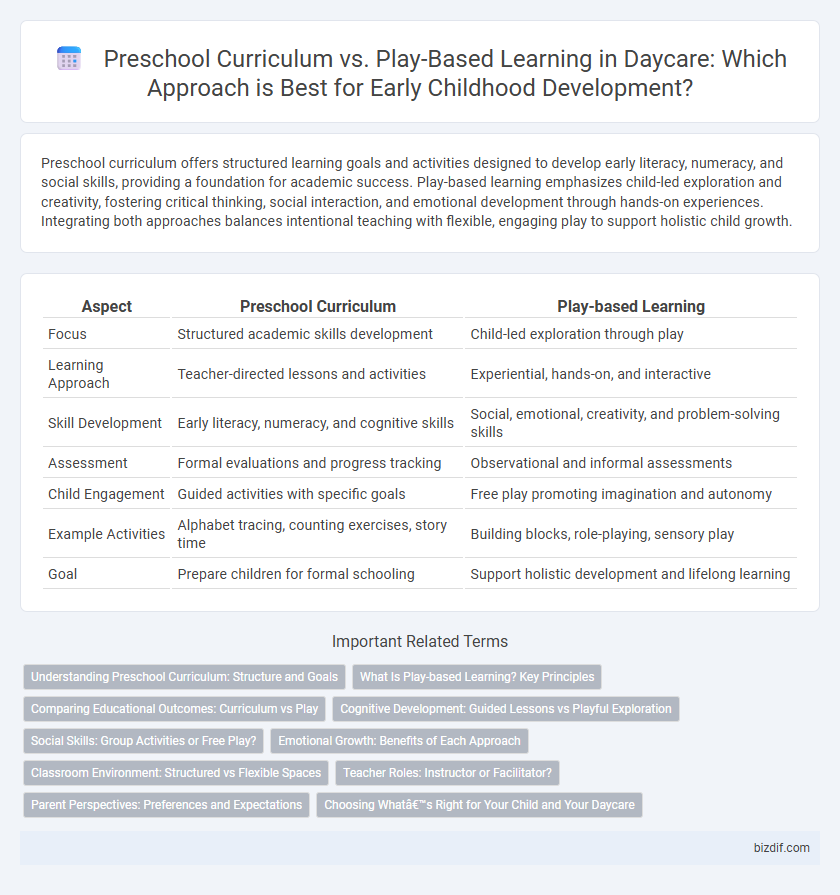Preschool curriculum offers structured learning goals and activities designed to develop early literacy, numeracy, and social skills, providing a foundation for academic success. Play-based learning emphasizes child-led exploration and creativity, fostering critical thinking, social interaction, and emotional development through hands-on experiences. Integrating both approaches balances intentional teaching with flexible, engaging play to support holistic child growth.
Table of Comparison
| Aspect | Preschool Curriculum | Play-based Learning |
|---|---|---|
| Focus | Structured academic skills development | Child-led exploration through play |
| Learning Approach | Teacher-directed lessons and activities | Experiential, hands-on, and interactive |
| Skill Development | Early literacy, numeracy, and cognitive skills | Social, emotional, creativity, and problem-solving skills |
| Assessment | Formal evaluations and progress tracking | Observational and informal assessments |
| Child Engagement | Guided activities with specific goals | Free play promoting imagination and autonomy |
| Example Activities | Alphabet tracing, counting exercises, story time | Building blocks, role-playing, sensory play |
| Goal | Prepare children for formal schooling | Support holistic development and lifelong learning |
Understanding Preschool Curriculum: Structure and Goals
Understanding preschool curriculum involves recognizing its structured framework designed to promote cognitive, social, and emotional development in early childhood. The curriculum typically includes specific learning goals aligned with developmental milestones, emphasizing foundational skills such as literacy, numeracy, and problem-solving. This structured approach contrasts with play-based learning by providing clear objectives and assessments to guide educators in fostering school readiness.
What Is Play-based Learning? Key Principles
Play-based learning is an educational approach that emphasizes child-led exploration through activities that promote cognitive, social, and emotional development. Key principles include fostering creativity, encouraging problem-solving, and supporting active engagement with peers and the environment. This method contrasts with traditional preschool curriculum by prioritizing hands-on experiences and intrinsic motivation over structured lessons and direct instruction.
Comparing Educational Outcomes: Curriculum vs Play
Preschool curriculum offers structured learning objectives that target cognitive and language development through guided activities, while play-based learning emphasizes social, emotional, and creative skills by encouraging exploration and imagination. Studies show that children engaged in curriculum-driven programs often demonstrate stronger early literacy and numeracy skills, whereas play-based learners excel in problem-solving and collaboration. Balancing both approaches can optimize educational outcomes by fostering comprehensive development in preschoolers.
Cognitive Development: Guided Lessons vs Playful Exploration
Preschool curriculum typically structures guided lessons targeting specific cognitive skills such as memory, problem-solving, and language acquisition, providing clear developmental benchmarks. Play-based learning emphasizes playful exploration, nurturing creativity, critical thinking, and social interaction by allowing children to experiment and discover at their own pace. Combining both approaches can enhance cognitive development by balancing intentional instruction with opportunities for imaginative, self-directed learning.
Social Skills: Group Activities or Free Play?
Preschool curriculum emphasizes structured group activities that foster social skills such as sharing, cooperation, and communication through guided interactions. Play-based learning prioritizes free play, allowing children to explore social roles and develop empathy naturally within unstructured environments. Balancing both approaches can enhance social competence by combining intentional skill-building with spontaneous peer engagement.
Emotional Growth: Benefits of Each Approach
Preschool curriculum provides structured activities that support emotional growth by fostering self-regulation, empathy, and social skills through guided lessons and group interactions. Play-based learning enhances emotional development by encouraging children to express feelings, experiment with social roles, and build resilience in a natural, child-driven environment. Combining both approaches can create a balanced setting where children develop emotional intelligence while enjoying creativity and interpersonal exploration.
Classroom Environment: Structured vs Flexible Spaces
Preschool curriculum emphasizes structured classroom environments with defined learning zones and scheduled activities to support developmental milestones and academic readiness. In contrast, play-based learning prioritizes flexible spaces that encourage exploration, creativity, and social interaction through child-initiated play. Both approaches optimize early childhood development but differ in the balance between teacher-guided instruction and learner autonomy.
Teacher Roles: Instructor or Facilitator?
In preschool curriculum, teachers primarily act as instructors by guiding structured lessons that meet educational standards and developmental goals. In play-based learning, teachers function as facilitators, creating environments where children explore, discover, and build social and cognitive skills through interactive play. Balancing these roles enhances child development by combining intentional teaching with child-led experiences.
Parent Perspectives: Preferences and Expectations
Parents often prioritize a preschool curriculum that balances structured learning goals with play-based activities, valuing approaches that foster cognitive, social, and emotional development. Many expect educators to integrate foundational academic skills, such as early literacy and numeracy, within engaging, child-centered play to support motivation and creativity. Preferences tend to favor environments where play-based learning complements curriculum objectives, promoting holistic growth and preparing children for formal schooling.
Choosing What’s Right for Your Child and Your Daycare
Preschool curriculum offers structured learning with specific goals in literacy, numeracy, and social skills development, ideal for children who thrive in routine and clear expectations. Play-based learning emphasizes exploration and creativity, fostering cognitive and emotional growth through hands-on experience and social interaction. Choosing the right approach depends on your child's learning style and your daycare's philosophy, balancing structured academic readiness with the benefits of imaginative play.
Preschool Curriculum vs Play-based Learning Infographic

 bizdif.com
bizdif.com